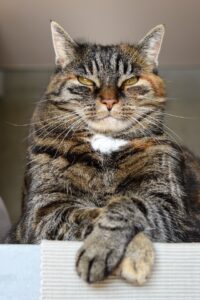Caring for Senior Cats
I was reading an article on Considerations Before Adopting Your First Cat which every one should read if they are considering adopting a cat. As I also read that senior cats seem to stay longer at shelters for an odd reason I was thing what it would take caring for a senior cat.
Adopting and caring for senior cats

As cats age, their needs change, and they require more attention and care than younger cats. Senior cats are typically those over the age of 7, although some cats may start showing signs of aging earlier or later than others. As a cat parent, it’s essential to be aware of the changes that come with aging and take steps to ensure your senior cat remains happy and healthy. In this article, we will discuss how to care for senior cats.
-
Regular Veterinary Check-ups
Senior cats require more frequent veterinary check-ups than younger cats. They should be taken to the veterinarian at least twice a year for a thorough examination. The veterinarian will check your cat’s weight, blood pressure, and perform blood tests to detect any underlying health problems.
-
Monitor their diet
As cats age, their dietary needs change. They may require fewer calories, but their diet should be rich in high-quality protein to help maintain muscle mass. Talk to your veterinarian about the best diet for your senior cat. They may recommend a senior cat food that is lower in calories and fat but high in protein.
-
Provide proper hydration
Senior cats may be prone to dehydration due to a decrease in their ability to conserve water. Make sure your cat always has access to fresh, clean water. Consider investing in a pet fountain to encourage them to drink more water. Also, try adding wet food to their diet to increase their water intake.
-
Ensure Comfortable Living Conditions
Senior cats may have a harder time jumping and climbing, and they may require more comfortable sleeping areas. Consider providing your cat with a soft, warm bed, and placing it in an easily accessible location. If your cat is having trouble climbing stairs or getting onto furniture, consider providing steps or ramps.
-
Regular Exercise
Senior cats may become less active and may not be as interested in playing as they once were. However, regular exercise is still essential to maintain muscle tone and keep joints flexible. Encourage your cat to play by providing toys that are easy to bat around or play hide-and-seek with treats.
-
Brushing and Grooming
Senior cats may have trouble grooming themselves due to decreased flexibility or arthritis. Help your cat by brushing their coat regularly to remove any loose fur and prevent matting. Also, consider trimming their nails if they are not wearing down naturally. Long nails can cause discomfort or even lead to painful ingrown nails.
-
Environmental Enrichment
Cats are naturally curious and need mental stimulation to prevent boredom and maintain their health. Provide your senior cat with plenty of toys, scratching posts, and hiding spots. Consider rotating their toys and moving their furniture to keep things interesting.
-
Watch for Signs of Cognitive Dysfunction
Cognitive dysfunction, or senility, is common in senior cats. Signs may include disorientation, confusion, or changes in behavior. If you notice any of these signs, talk to your veterinarian, who may recommend medication or dietary changes to help manage the condition.
By the way regardless of age you should still try to learn what your cat is telling you and get the break through book on the subject.

In conclusion, caring for senior cats requires a bit more attention and care than younger cats. Regular veterinary check-ups, proper nutrition and hydration, comfortable living conditions, regular exercise, brushing and grooming, environmental enrichment, and watching for signs of cognitive dysfunction are all essential to ensure your senior cat remains happy and healthy. With proper care, your senior cat can live a long, healthy, and happy life.
This content may contain links to products, software and services. Please assume all such links are affiliate links which may result in my earning commissions and fees.
